Last weekend, Bizgenics Foundation produced a 100 percent virtual online hackathon in partnership with HIplan for the University of Hawaii at Hilo and Hawaii Community College. It was a first in many ways that holds promise for the future of education beyond the current Coronavirus threat. See the Highlight Video »
Huge mahalo to sponsors Kamehameha Schools, Ulupono Initiative, County of Hawaii, University of Hawaii at Hilo and Hawaii Community College. Thanks also to all the mentors, volunteers and staff for pulling this event off.
Read the News Release:
Amid COVID-19 Stay at Home Orders, Global Hackathon Runs 100 Percent Virtual Through Online Challenge-Based Learning System
Students and Mentors Around the World Collaborate to Create Disaster Recovery Apps
HILO, HAWAII – Billed as the Aloha State’s first virtual hackathon, 4 teams of students from the University of Hawaii at Hilo (UH Hilo) and Hawaii Community College (HawCC) competed remotely from home locations as far away as Spain, Mexico, Washington and California to develop app-based solutions for lava recovery efforts from the 2018 Kilauea eruption. Mentors offered advice from remote locations as far away as Bangladesh, San Francisco and North Carolina. The HIplan Hackathon took place April 4 – 5, 2020 from 10am-5pm each day and $5,300 in cash prizes was awarded to winning teams.
$2,500 First Place went to Makamae Kamaka-Mauhili, Brian McMichael, Karly Requelman and Zoe Whitney of The Repair Crew for their Home Raisers App, $1,500 Second Place went to Kevianna Adams, Santos Gutierez, Ryen Helzer and Catherine Kane-Paulo of CommUnity Inc. for their Coconut Grove App, $1,000 Third Place went to Luca Checchia Adell, Casey Chow, Kevin Oh and Jena Shidaki of Double D for their Disaster Defense App, and $300 Fourth Place went to Alan Cincunegui Corres, Kapaia’alaopuna Earle and Garnett Stone Jr. of Second Responders for their Second Wave App.
“We were all set to run this hackathon when COVID-19 shut down schools so many of the students returned home to far-flung places around the globe,” said Jason Ueki, Executive Director of HIplan. “We were set to use BizzyB.com, an online challenge-based learning system for the hack and realized that we could run the hack remotely with BizzyB. The most surprising thing for me is that our hack turned into a truly global event with both students and mentors collaborating from remote locations around the world.”
Says mentor Phillipe Rosse, “This is a game-changer. With BizzyB, we realized that we can connect students and mentors in deeper and more efficient ways than ever before. The quality of ideas and attention to detail generated concepts that are infinitely more mature than your average hackathon contest. This takes hacks and STEM education to new heights. BizzyB represents the future of education.”
The goal of any hackathon is to challenge students to address real-world problems, in this case, conceptualizing app-based solutions to support Kilauea Volcano eruption recovery efforts facing Hawaii County. By participating in hands-on concept development activities, students learned leadership, collaboration, creative problem-solving and other “Soft Skills” that are increasingly demanded in today’s business world.
“When schools began closing due to Coronavirus, we made BizzyB entirely free for the rest of the school year,” says BizzyB author and Bizgenics Foundation Chairman Steve Sue. “The HIplan Hackathon is a smart, forward-looking application of BizzyB’s Contest Module created to serve in-class challenges, hackathons, business plan competitions and accelerators. We’re happy to support HIplan and other producers of innovation-based learning programs.”
BizzyB’s approach combines self-directed learning, 4Cs learning (Creativity, Critical-Thinking, Collaboration & Communication), STEM learning (Science, Technology, Engineering & Math) and SEL (Social Emotional Learning). The result is an online innovation Concept Canvas where student teams collaborate on five essential themes of an innovation project. This canvas supports remote collaboration via sidebar comment channels, built-in feedback surveys, pitch deck builder and showcase presentation functions. Mentors can view team content and advise remotely from anywhere, anytime. Team members also experience corporate leadership roles serving as facilitators of the five themes. 21st Century Soft Skill measurement standards are measured in the system by pre- and post-project user surveys. Outcomes are reported through contest public pages and through individual student portfolios that feature project summaries, awards, certifications, badges and Soft Skill assessments.
The event was sponsored by Kamehameha Schools, Ulupono Initiative, County of Hawaii, UH Hilo, and HawCC. It is being produced by the Hawaii Island Business Plan Competition (HIplan) and the nonprofit Bizgenics Foundation.
Judges included Melanie Wilson, Dean of Liberal Arts & Public Services at HawCC, tech entrepreneur Steve Sakoman of Steve Sakoman Inc., and Chris Rehkamp, former Program Manager at the Digital Center for Entrepreneurship at the University of Maryland. Mentors included Director of Accelerator Operations at Elemental Excelerator Sherrie Totoki in San Francisco, Americas Advisory Learning Leader Louise Lorton of Ernst & Young in North Carolina, Phillipe Rosse from RFP Match, North Carolina. Facilitators included local entrepreneur Mike Nakamura, former tech executive Wayne Morris, and retired tech professional Walter McCoy.

